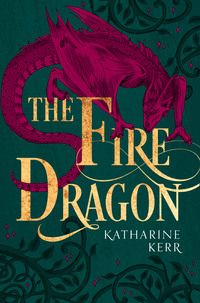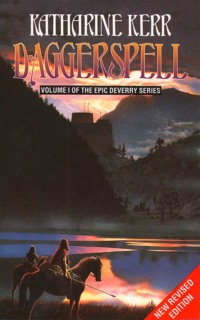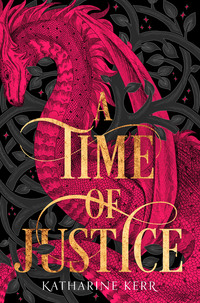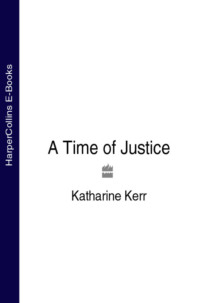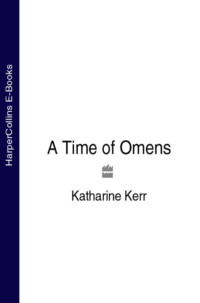
Полная версия
Snare
Hazro had been a stupid young fool, a snob and apparently a coward as well. But to think that Lev Rashad – Warkannan shook his head. The very curse of the Chosen was simply that they were secret and very good at staying that way. An army within an army, they existed to spy on their fellow soldiers as well as do the Great Khan’s dirty work among civilians. They lived in the same barracks, ate at the same mess, carried the same insignia as the other members of their regiments, but somewhere in their career, they’d been taken aside and initiated into a brotherhood with rules of its own.
And they force the rest of us to sink to their level, Warkannan told himself. Maybe that’s the worst evil of all.
In the morning, when they set off for Haz Kazrak, one of Indan’s servants followed them in the cart which was laden with an enormous woven basket filled with dried fruit and other delicacies, or so the servant thought. Certainly it smelled of rich spices and rose petals. Once they reached the city, the servant and the cart both headed for Indan’s townhouse, while Warkannan and Arkazo went openly to Warkannan’s cottage, which he kept as a relief from officers’ quarters when off-duty.
Down on one of the lower hills in town lay a district full of these places, decent accommodations, complete with stables, for aristocratic officers like Warkannan, who had income from property but who weren’t wealthy enough to keep townhouses with a full staff. Warkannan’s little bungalow sat at the back of the communal garden, six irregular rooms bound together by vines and furnished with shabby wicker chairs and old rugs. When he and Arkazo walked in, his only servant, Lazzo, met him with a letter.
‘It’s from headquarters, sir.’
‘Ah. I wonder if they’re taking my resignation?’
Warkannan took the sheet of pale pink rushi over to the window. The letter read exactly as he’d hoped, a bland official statement of regret at losing such a good officer. He was to report one last time to determine his pension settlement.
‘So that’s that,’ Warkannan said. ‘If they’re so sorry to lose me they might have promoted me.’
‘I’m glad now I never enlisted.’ Arkazo flopped onto a wicker sofa.
‘Oh, I don’t know. The discipline’s good for a man. I don’t regret –’
One sharp jolt like the slap of a giant hand made the room sway. The flexible walls creaked and chafed against their binding vines as they rippled in the shock. Warkannan braced himself and glanced at the wall. A long strand of blue beads hung on a leather thong attached to a plaque of true-wood, marked out in numbered, concentric circles. The beads swung back and forth against the gauge. As he watched, the quake died out in a long shiver. The beads quieted and hung steady.
‘Just about a five,’ Warkannan said.
‘It didn’t feel like much, no,’ Arkazo said. ‘Anyway, you’ve always talked about the discipline. That’s one reason I don’t want to join up.’
‘Huh! Well, you’re going to learn about discipline now. You follow my orders, or you stay at home.’
Lounging on overstuffed cushions Arkazo raised one hand in salute. ‘Yes sir!’ he said and grinned. ‘At your service!’
‘All right. For starters, you can pack my clothes as well as yours.’
They went into Warkannan’s bedroom, where, in a chest woven of pale orange reeds, Warkannan kept what few civilian clothes he owned – khaki trousers, shirts to match, a broad-brimmed riding hat, worn brown boots. He dumped the lot on the bed, then looked away, startled at a feeling much like grief. Civilian clothes. Tonight he would be taking off the Great Khan’s uniform for the last time. As an honourable retiree he would be allowed to keep his sabre - but I’m a traitor, he thought. I have no honour. They just don’t know it yet.
‘Uncle?’ Arkazo laid a hand on his shoulder. ‘Is something wrong?’
‘No, no, nothing. I’ll just go report in to settle my pension. I want our gear properly packed when I get back. Make sure you have a hat with you. The sun’s fierce out on the plains.’
Just after sunset, Warkannan and Arkazo were sharing some smuggled wine in the study when Lubahva arrived from the palace. Normally she wore modest dresses and a headscarf when she left the palace grounds, but that evening she’d draped herself with the grey veils of the ultra-orthodox, which turned her into a pious bundle indistinguishable from a thousand other women. Her behaviour, however, was far from restrained. She giggled while she tipped the old servant and made a show of lifting her veil to give Warkannan a kiss. Once the servant was gone, Lubahva sat down on a divan and pulled the veil off to reveal her black hair, done up in rows of beaded braids.
‘Are you sure this is safe?’ Warkannan said.
‘Why not?’ She smiled briefly. ‘I told them I was on my way to a women’s prayer service, and I am. I’ve just stopped by for a minute with news. A Kazrak rode out from one of the northern border forts, a merchant saying he was going to take his goods out to the Tribes.’
‘Oh really? With the chance of running into prowling ChaMeech? That I don’t believe. We’ll leave from the north and try to catch up with him.’
‘You’re really going to go through with this?’
‘I don’t have any choice. Arkazo and I are leaving tomorrow. The sorcerer’s joining us on the road.’
‘Ah, Soutan!’ Lubahva said with a sigh. ‘Well, even fake magicians can carry letters. All right. I’ll keep in touch with Indan while you’re gone.’
As they walked to the door, she veiled herself, but she left the panel over her face down for one last kiss.
‘Idres?’ she said. ‘Will I ever see you again?’
‘That’s up to God, isn’t it? I hope so.’
‘I suppose it is, yes. I’ll miss you.’
‘I’ll miss you, too. Remember me in your prayers.’
‘Every day. I promise.’
Lubahva pulled up the veil, turned fast and started off down the path to the street. Watching her shoulders tremble, Warkannan realized that she was weeping. He was honestly surprised.
Deep in the night, after Arkazo had gone to bed, Warkannan put on his civilian khakis, hid a dagger in his shirt and took a stout walking stick as well, then hurried through the dark streets to Indan’s townhouse, some five blocks uphill from the compound owned by Hazro’s family, the Mustava clan. At the back gate Indan’s mayordomo, a man with years of loyalty behind him, met him in the darkness. Together they rolled the wicker basket down the silent mews to the Mustava garden. The white wall stood too high for the pair of them to lift or throw the grisly contents over. A porter’s little hut at the back gate, however, stood empty. Warkannan rolled the basket inside, tipped the mayordomo, then hurried away, trotting through back alleys, keeping out of the occasional pool of lantern light. He met no one and returned to his bungalow without waking Arkazo.
Warkannan lingered in the city the next morning to hear the news about Hazro’s corpse. It reached him early in the person of a light-skinned eunuch, Aiwaz, the supervisor of the court musicians, who knew both the Mustavas and the Warkannans. Swathed in white gauze robes he waddled into Warkannan’s living room and stood shaking his head, his face deathly pale, while he repeatedly wiped his mouth with a yellow handkerchief.
‘It was horrible,’ Aiwaz said. ‘Hazro’s father found the body. He went down to unlock the back gates, and there it was.’
‘What?’ Warkannan did his best to look shocked. ‘Just thrown onto the street?’
‘No. Here’s the fiendish part. There was a basket there, smelling of spice, just as if someone had left some sort of gift. Inside was the body.’ Aiwaz paused, swallowing heavily. ‘Mutilated. Cut and burned in the cuts. The poor old man fainted. Just let out one sob and fainted.’
Warkannan looked away fast. His memory of that night in Indan’s attic rose up and sickened him. He had never thought that Hazro’s father would find the thing himself.
‘Yes, the poor old man.’ Warkannan could hear his voice choking on the words. ‘I’m so sorry.’
‘So are we all.’ Aiwaz dabbed his mouth again. ‘Of course, none of the Mustavas could possibly know who did this.’ He raised a plucked eyebrow significantly. ‘But the boy’s uncle swears he’ll have his revenge. He seems to know whom he’d choose for a suspect.’
‘Ah, yes, I see what you mean.’
They shared a grim smile. Warkannan turned away to find Arkazo, wearing only a pair of white trousers, standing in the hall that led back to the bedrooms. From a window sunlight fell across his pale brown chest in a stripe and left his face in shadow. The boy stood with his back against the door jamb as if he thought someone might attack him from behind.
‘It’s a horrible thing,’ Aiwaz repeated. ‘I’d best be on my way. A couple of other families need to hear the news.’
Warkannan showed him out, then turned back to his nephew. Arkazo took a couple of uncertain steps into the room, staring at Warkannan as if at a stranger.
‘You’re wondering how I could do such a thing,’ Warkannan said.
Arkazo nodded.
‘Because all our lives depended on it. Because our khan’s life depends on it.’
Arkazo looked away, his shoulders high as if he feared a blow. Warkannan could hear Lazzo clattering dishes in the kitchen. The sound seemed to ring as loud as gongs.
‘Do you still want to go along on this ride?’ Warkannan said at last.
‘Yes.’ Arkazo turned back to him. ‘I just –’ He paused for a long moment. ‘I didn’t realize it was – well – real before. I mean, the whole idea of riding east and all that. It seemed like one of those stories they tell in the coffee houses.’ He forced a twisted smile. ‘It sure as hell doesn’t feel like that any more.’
‘Good. This is going to be the hardest ride of your life. Remember that.’
‘I will, sir.’
‘Good. Now get something to eat and get dressed. We’ve got to get on the road.’
Arkazo nodded and trotted back down the hall to his room.
Once they were ready to leave, Warkannan attended to one last detail while Arkazo went to fetch their horses. He wrote a letter to Indan asking him to take care of Lazzo and gave it to the old servant to carry out to the villa.
‘It’ll be a long walk for you, Lazzo, but you don’t dare stay here once I’m gone. Indan will tell you why.’
Lazzo’s pouchy eyes widened in fear.
‘Don’t linger, no,’ Warkannan said. ‘Leave before sunset, just in case. Don’t worry about the furniture. The Chosen are welcome to it if they want it.’
Warkannan gave him a small bag of coins for the trip, then slung his saddlebags over his shoulder and strode out. Soon, if the Lord allowed, by bringing Jezro home he would be freeing Haz Kazrak from a madman.
Nehzaym heard about their departure later that same day. She was working on her payroll accounts out in the warehouse office when Lubahva arrived, her arms full of bags and boxes from the shops. She laid them down on the floor, dropped her grey veils on top of them, and pulled a high stool over to Nehzaym’s desk. She perched on it with a sigh and wiggled her feet as if her sandals pained her.
‘Idres and Arkazo are leaving today,’ Lubahva announced. ‘They wanted to get an early start, so I suppose they’re gone.’
‘Well, it’s a good bit after noon now,’ Nehzaym said. ‘I was beginning to worry about you.’
‘I know, I’m sorry. I had a lot of shopping to do for the secluded girls.’
‘All right.’ Nehzaym laid down her pen. ‘I’m glad that things are finally moving. The longer Soutan stayed in Haz Kazrak, the more anxious I got.’
‘I hope the Chosen don’t suspect Idres, is all. He’d never break under torture, but I bet he’d tell them everything to save his nephew from it.’
Nehzaym felt her stomach clench. There was so much to fear, and all the time. ‘That’s true. Kaz has always been more like Idres’ son than his nephew.’ Nehzaym turned her palms upward. ‘Inshallah.’
‘Yes, whatever the Lord wills.’ Lubahva paused, thinking. ‘Are we meeting again tonight? I don’t have a rehearsal, so I could come.’
‘I don’t think it’s wise. You came here last night, and you’ve been out of the palace all morning. The eunuchs might wonder about you if you stay out for the evening as well.’
‘I can tell them the truth. They know we meet for women’s prayers. I don’t have to tell them what we’re praying for.’
‘Yes, but the Chosen also know that Soutan’s part of my new business venture. I don’t want anyone adding things up.’
‘You’re right about that.’ Lubahva considered, sucking on her lower lip. ‘The Fourth Prophet. Do you truly think she’ll be female?’
‘That’s what the Sibyl’s prophecies tell us.’
‘But what if the mullahs are right, and she’s a demon?’
‘The mullahs condemn anything they don’t understand. Now remember: we can’t tell if the Fourth Prophet’s meant to come in our lifetime. All we can do is watch and wait.’
‘But – no, you’re right. I won’t carp any more. If she comes to us, she comes. Inshallah.’
‘Oh yes. Inshallah.’ Nehzaym suddenly smiled. ‘But if she does come, she’ll find us waiting.’
On their second day out of Haz Kazrak, Warkannan and Arkazo met up with Soutan in the little resort town of Samahgan, famous for its hot springs. So many people flowed into and out of its spas and medical clinics that no one would question why a retired cavalry officer and his ward would turn up at the same hotel as a foreigner like Soutan. Still, all three of them pretended to great surprise when they met in the dining room. Soutan made a show of insisting they eat with him.
‘It’s good to see a familiar face,’ Soutan said. ‘I’m leaving tomorrow, though.’ He paused, letting a waiter get within earshot. ‘I have to be back in Haz Kazrak to meet with the bankers.’
‘We’re moving on ourselves.’ Warkannan spoke clearly for the benefit of a passing group of customers. ‘Now that I’m retired, I’m going to visit my sister, Arkazo’s mother, that is. She lives up in Merrok.’
‘Give me the address. When I know how much working capital we can raise, I’ll send you a letter.’
The waiter, young and shiny clean in his loose white pants and white tunic, showed them to a low table surrounded by velvet cushions. Soutan had chosen an expensive establishment. The dining room held a good fifty tables placed on fine carpets. True-wood panels hung from the reed and bamboid walls. The men all sat, arranging themselves while a young servant girl dressed in a white shift brought warm water, towels, and a large basin. The waiter rattled off the evening’s menu as they washed their hands, then helped the girl carry the utensils away. Soutan leaned close to Warkannan and spoke quietly.
‘We’ve had great luck, or else the Great Khan has had very bad luck. Either might be possible.’
‘I suppose so, if you want to split hairs,’ Warkannan said. ‘What was it?’
‘I was in the marketplace yesterday when I saw two cavalrymen ride in. They were official messengers from the look of their saddlebags, and they rode straight to the fort here in town.’ Soutan paused, glancing around him. ‘I have ways of learning things. They were carrying messages to Blosk.’
‘I’m sure they would have told anyone who asked them that.’
‘Indeed? Would they and their fort commander tell anyone who asked what the messages said?’ Soutan paused for another look round. ‘One of my spirits followed them into the post. They were discussing a certain officer down on the border who’s about to get cashiered and turned out of the cavalry. Both of them thought the situation was odd for some reason.’
‘So?’ Arkazo leaned forward to interrupt. ‘What does that have to do –’
The waiter came back, bowing and smiling. They ordered, he bowed again, three, four times, then strode away at last.
‘If the Chosen are sending a man east,’ Soutan said to Arkazo, ‘he’d never make it across the Rift alone. This time of year the Tribes come to the border, and he might well be able to travel with one of them.’
Arkazo’s mouth framed an ‘oh’. The waiter came back with a large brass tray of appetizers and set them down with a flourish.
‘Your first course, gentlemen,’ he said. ‘Shall I bring coffee?’
‘No, not yet,’ Warkannan said. ‘At the end of the meal.’
With narrow eyes Soutan watched the waiter leave. ‘I wonder if that boy is just a waiter,’ he remarked. ‘Probably so.’
‘Probably.’ Warkannan allowed himself a brief smile. ‘We’ll talk more once we’re in our cottage. You can see what it’s like, Soutan, to live with the threat of the Chosen.’
‘Yes, I can. I can’t say I like it.’
After the meal they left the dining room and walked outside, heading for the gardens and their guest cottage. Beside the outer doors crouched a woman, her face bound with the black ribbons of widowhood. Two small children clung to her.
‘Charity, sirs?’ she whispered and held out trembling hands. ‘Charity, oh please?’
The others hurried past, but Warkannan stopped. Beggars here, in wealthy Samahgan, even here! He fished a couple of silver deenahs out of his pocket and pressed them into her hand.
‘May God provide better,’ he said. ‘And soon.’
Out to the east of the khanate, all of the grass grew purple. No one kept a garden or tilled a field on the other side of the sunset-coloured hills that marked the khanate’s border. A treaty dating back to Landfall forbade it, a pact so sacred that not even the ambitions of the Third Prophet could force the Kazraks to break it. Besides, without the open grasslands, there would be no horse-herds, and without a large number of horses the Kazraks would have no cavalry. All ambitions would become empty, then.
On the night that Warkannan was dining in Samahgan, the Tribes brought their stock into the border town of Blosk for the spring horse fair. The comnees, as the travelling groups were called, came out of the lavender grasslands, herding their horses ahead of them. Most rode, but some of the women drove rickety orange wagons, made of lashed-together bamboid, heaped with their possessions. Down by the river that flowed near town, they set up round tents stitched together in a patchwork of coloured saurskins and grey horsehair felt. In the meadows they tethered their horses with tasselled halters and drew the gaudy wagons into a circle. By the third day over a hundred tents stood in clusters out on the grass.
Children ran and played in the impromptu village while their parents brought out hoards of dried horse dung to fuel cooking fires or walked from tent to tent to greet old friends. Everyone talked about the trading ahead. The Great Khan’s gold bought the necessities that only farmers could supply, such as grain, soap, and lamp oil, as well as trinkets like brightly coloured cloth and gold jewellery. Men and women both wore gaudy belt buckles, brooches, and clasps for cloaks, cast or hammered into the shapes of mythological beasts, such as the stag, the wolf, and the lion.
Ammadin picked the spot for her maroon and grey tent on the edge of the encampment, a good distance from all this convivial chaos. In silent respect, the members of her comnee, sixteen extended families in all, raised her tent, carried her possessions over from the communal wagons, then left her alone. Inside she arranged her belongings: her roll of blankets, her leather-and-wood folding stool, her two cooking pots, and the four big grey-and-blue woven tent bags that held her clothes and tools. Her most precious belongings never travelled in the wagons. In saddlebags of purple leather she carried her spirit crystals, her silver talismans, and her feathered spirit wands. The god figures of her tribe had their own pair of saddlebags, lined in fine white cloth from the Cantons far to the east.
Ammadin was arranging the god figures on their red-and-white striped rug when Maradin crawled through the tent flap. A blonde, handsome woman with skin the colour of gold, Maradin was the only person who dared enter Ammadin’s tent uninvited. She pressed her palms together and bowed to the god figures, squat stone carvings, wrapped in coloured thread and decorated with feathers and precious stones. Only then did she speak.
‘Dallador bought some mutton, and he’s making stew. Do you want to come eat with us?’
‘Yes, thanks. Have the Kazraks got here yet?’
‘A couple of their officers rode up a few minutes ago. Apanador’s taken them into his tent for some keese.’
In front of Maradin’s tent, pieced together from mottled purple and white skins, her husband Dallador was cutting chunks of meat from a haunch and putting them into an iron kettle. Their three-year-old son sat on the ground nearby and watched him. A good-looking fellow with hair so pale it was almost white, Dallador was dressed in the usual leather trousers of the Tribes and a red-and-blue cloth shirt; his belt had a palm-sized gold buckle in the shape of a horse, its legs tucked up, its head turned as if it were looking behind it.
‘I hear the Kazraks are in the mood to buy,’ Dallador said. ‘Are you going to sell that pair of greys?’
‘If they’re stupid enough to take them,’ Maradin said. ‘I’ll give them a dose of herbs before I bring them over.’
While Dallador tended the stew pot, Maradin brought out wooden drinking bowls and a leather skin of keese, a liquor made of fermented mare’s milk. She was pouring it round when Palindor strolled up to the fire. A handsome, almost pretty young man with strikingly large blue eyes and coppery skin, Palindor smiled once at Ammadin, then squatted down beside Dallador.
‘I invited Palindor to eat with us,’ Maradin announced.
Ammadin felt like kicking her – she was match-making again, damn her! Palindor accepted a bowl of keese with a murmured ‘thank you’ and looked at the ground. As an unmarried man, he had no standing in the comnee and no horses but the one his mother had given him to ride. He did, however, have a fine reputation as a warrior in the endless squabbles and raids that went on between the comnees. One of the bravest of the brave, men said of him, and as good with the long knife as he was with the bow. For the sake of that, Ammadin did her best to be pleasant to him during the meal.
By the time they were done eating, the skin of keese was empty, and Dallador brought out another. As he was refilling Palindor’s bowl, he splashed keese on the back of his unsteady hand.
‘Dallo?’ Maradin said.
‘I know. I’ve had enough.’ Dallador handed the skin to Palindor, then began licking the spilled keese off his hand while he smiled, heavy-lidded, at Maradin, who smiled back as languidly as if she were drunk herself.
All through the camp, fires glowed like golden blossoms among the tents. Here and there, men began to sing to the dahsimmer, a three-stringed instrument, one for the melody, two for the drone. Every time he had a sip of keese, Palindor would look at Ammadin so longingly that she realized that he was in love with her, not merely greedy for the horses a wife would bring him. Ye gods! she thought. What’s he doing, taking lessons from Dallo? She got up, excused herself, and went to her tent. Before she closed the flap, she listened for a moment to the clear strong voices of the men, singing of the two things they loved above all else: the hunt and war.
About an hour after dawn, the Kazrak officers rode down from the fort in Blosk to start the day’s haggling. The women and girls cut the horses they wanted to sell out of the herds and brought them down to the riverbank in a snorting, prancing procession. Their husbands and brothers stood nearby to make sure the Kazraks treated their women with the proper respect. Every man had the short curved bow slung over his back and in his belt, the leaf-blades steel knife, about eighteen inches long, that marked a man as an adult. In their red tunics, buttoned tight with silver pegs, and grey wool trousers, the Kazrak officers moved stiffly, their backs as straight as arrows.
When Ammadin brought down two bay geldings from her herd, the comnee women fell back to let her have the first place in line. A dark young officer introduced himself to her as Brison and began to examine the bays. He ran practised hands down their legs and over their chests, then looked into their mouths.


